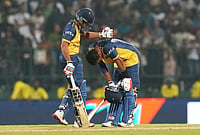"I’m Ganga!" announced the right head, tossing a right plait.
"I’m Jamuna!" exclaimed the left head, tossing the left plait.
"I vote CPM!" declared one head,
"I vote Congress!" said the other,
"Jai Bangla!" chortled one head,
"Jai Bharat!" giggled the other.
Overcome by the heat and the crowds, Sen beats a quick retreat, but the reader is more firmly ensnared.
Baulsphere is a many-layered work of social history, musicology, anthropology, memoir and travelogue. Yet at its heart it is the story of the unlikely love between a magnetic young Baul singer named Paban Das Baul and a rebel daughter of the bhadralok, author Mimlu Sen. Immured in her expat life, Sen’s memories of her Shillong childhood are awakened when she first hears the music of Paban’s Baul troupe. Returning from Paris, she accompanies him from mela to mela, surrounded by Vaishnavas and tantriks, dervishes and fakirs, Nagas and tribals, all the while clutching her ektara and trying to make sense of the man whose songs have so enchanted her.
Tagore first brought Baul music out of the countryside into the city. By convincing music producer Albert Grossman to bring Purna and Laxman Das Baul to the US, Allen Ginsberg launched them globally. Since then Bengal’s Birbhum has seen an influx of ethnographers, photographers, poets, musicians, documentary filmmakers and actors, all looking for something to take away from these latter-day troubadours for whom flouting the social order is second nature. Wealthy westerners or urban desis projecting their inchoate spiritual longings on the Bauls has made for a predictably fraught embrace, but the collapse of their traditional patronage system among the ashrams and villages, Sen points out, actually began much earlier.
When she began her journey, Sen had no desire to be initiated into the sexo-tantric sadhanas or to become a baulini. She kept a cool eye out for guru power-plays over disciples and the rivalries between singers for patrons. Even the Bauls—for all their supposed disregard of caste or religion, or their worship of female deities—can fall back into the kinds of parochial, exploitative and patriarchal mindsets that Sen ran away to Paris to escape. Yet her scepticism does not blind her. She enters into the spirit of play, enigmatic storytelling and musical ecstasy that reign in this charmed world. Her portrait of Paban and his extended Baul clan is sensitively observed. Paban himself, in Sen’s eyes, is soulful, colourful, as sensitive as a delicate handcrafted musical instrument, but also of this world. Less easy to convey is the experience of the music itself. Sen’s descriptions try to capture the ineffable but at times are a tad overblown.
But there are moments when Sen pulls back a curtain and suddenly we are transfixed by the scene behind it. Every evening in the Chhoto Goli behind Calcutta’s Kalighat temple, she tells us, women from local brothels perform rituals and sing songs to a male divinity, attended by sadhus and Bauls. The pimps and dealers can do little but watch. Suddenly, the outcaste role these women play is ennobled and made sacred. A woman who can lose herself in sexual abandon, they hear in the Baul’s song and the sadhu’s blessing, will gain access to her own soul. The prospect of this knowledge lifts them up as they return to their brothels for the night. "[I]magine if the hookers of Rue St Denis spent Saturday night in the local Chartreux monastery," Sen tries to explain to her French friends, "celebrating the divine quality of sexuality with the monks who served them liquor brewed in the monastery." I can only imagine the silence that followed that.
In these secular times, when religion is perceived to be more an instrument of division and dissonance than harmony, it is consolation enough to know there remain places where the most indigent, downtrodden and voiceless find the words to songs we only dimly remember. I can’t help but feel grateful that Mimlu Sen followed her heart and thought to tell us about her journey.
(Deborah Baker is author of A Blue Hand: The Beats in India)


























